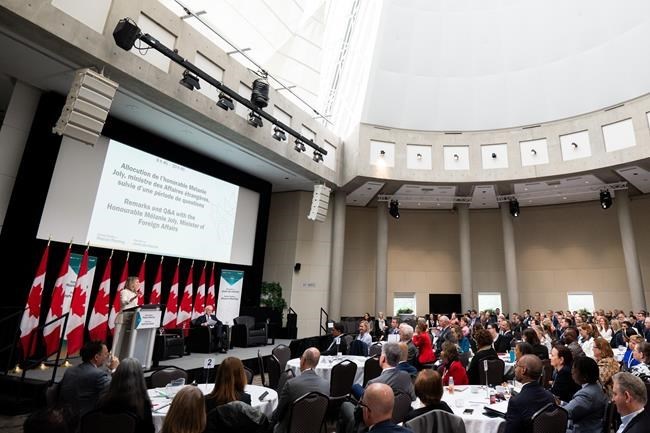OTTAWA — Global Affairs Canada is reforming its bureaucratic system for funding foreign-aid initiatives in a bid to approve funding requests faster and eliminate multiple layers of red tape.
Charities say Canada's international aid system is notoriously cumbersome. The system provides more than $6.5 billion a year in development aid for everything from education and climate-change adaptation to gender equality, in addition to humanitarian funding for emerging crises.
"They know they've been risk-averse. They know that the systems are outdated. They know that the administrative burden … is too high," said Shannon Kindornay, the head of operations for Cooperation Canada, whose group represents more than 95 non-profits.
The overhaul, referred to as the "grants and contribution transformation initiative" includes updating how Global Affairs staff assess funding applications from Canadian and foreign aid groups, as well as the reporting requirements Ottawa includes to track outcomes.
The initiative is also meant to change a culture that critics say prioritizes avoiding embarrassment over empowering local groups.
"The (grants and contribution transformation initiative) is an important aspect of (the department)’s Future of Diplomacy initiative, for which the objectives are to build new policy expertise while investing in new tools and systems, and ensuring the most innovative and efficient investments for years to come," said Geneviève Tremblay, a spokeswoman for Global Affairs Canada.
International Development Minister Ahmed Hussen has so far not agreed to an interview.
Groups working in the sector say the current system is often a bureaucratic nightmare, with Ottawa issuing vague directions for accessing funding, and then updating the reporting forms and requirements multiple times over the course of a project.
In some cases, a project operating on two different continents will be reviewed by separate geographical teams using the same criteria, because the department does not centralize all its processes.
Kindornay says the paperwork stems in part from a culture that began under the former Conservative government, where bureaucrats put an emphasis on avoiding any situation that could lead to unflattering media reports that suggest foreign aid is being misused.
"That chilling … definitely remains. The culture is risk-averseness for sure," she said. "The department is actually being pretty transparent and knows what the problems are."
Kindornay noted that Global Affairs Canada funds foreign organizations who run the gamut from global charities and organizations that have operated for decades in a single country, to small grassroots groups operating under dictatorships.
Funding the latter can involve "literally briefcases of money being sent over a border to a women's rights organization," she said, making it hard to give Ottawa receipts showing how the money has been spent.
"Particularly in certain countries where safety and security is a risk, asking someone to hold on to a taxi receipt that shows they went somewhere can be a real-life danger for that person."
Navigating these situations requires countries sending funds to "accept that you might lose a little bit of money in a riskier place, but you might also have huge gains, because you've taken that risk," Kindornay said.
The Canadian head of Save the Children says even large, long-standing charities struggle to cope with Ottawa's paperwork. "It's a complex system and there are different processes and expectations between branches," said Danny Glenwright.
"If an organization like ours has troubles and challenges in navigating that, I think local partners, small teams in the countries which we want to work with — which is critical to being as efficient with foreign aid as possible — are going to really struggle."
Glenwright took part in an event this past June that Global Affairs Canada called a "risk-appetite hackathon," an unconventional set of words for a department heavily steeped in protocol and paperwork. He described the event as a wide-ranging discussion on how Canada can best use its development dollars to cement real change that is driven by people on the ground.
He was among groups that urged the federal government to give more discretion to charities about how they use funds, since they are restricted in how funds are shared with foreign partners who don't have formal charitable status in Canada.
Glenwright said the event reminded him of his own organization's recurring work to assess the balance between ensuring dollars are put to good use and preventing onerous paperwork that freezes out some the most qualified local groups who are responding to a series of political, economic and food crises.
"We're always sort of looking at our risk appetite and threshold and checking our systems and processes to make sure that they're fit for purpose and as effective and efficient as possible," he said.
"We of course are hugely supportive of this process of transformation, and the ambition around it."
This report by The Canadian Press was first published Sept. 9, 2023.
Dylan Robertson, The Canadian Press



